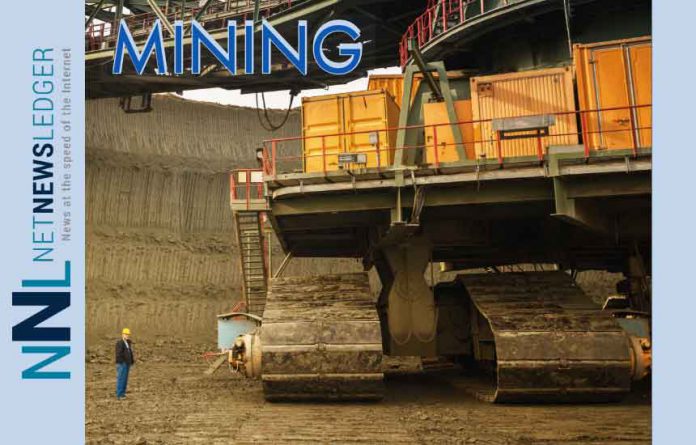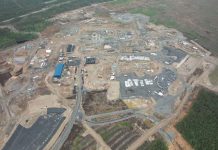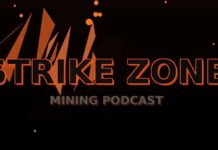TORONTO – MINING – Noranda Income Fund (TSX:NIF.UN) (the “Fund”) today reported its financial results for the first quarter ended March 31, 2022. Except where otherwise indicated, all amounts in this press release are expressed in US dollars.
First Quarter 2022 Highlights (compared to same period in 2021)
- Loss before income taxes of $35.6 million, including an unrealized derivative financial instrument loss of $17.4 million, compared to earnings before income taxes of $11.0 million, including an unrealized derivative financial instrument gain of $0.1 million
- Adjusted EBITDA1 of $(1.1) million compared to $17.1 million
- Zinc metal production of 57,588 tonnes compared to 66,345 tonnes
- Zinc metal sales of 56,826 tonnes, compared to 66,277 tonnes
“Our first quarter financial results reflect lower production and sales, and a high unrealized derivative instrument loss resulting from a large hedge book and the rapid increase in zinc prices in the quarter. As the derivative instruments are used to provide zinc price protection, we expect that the underlying zinc will drive gains in future quarters as zinc concentrate is processed and refined zinc metal is sold depending on future zinc prices,” said Paul Einarson, Chief Executive Officer of Canadian Electrolytic Zinc Limited, Noranda Income Fund’s Manager. “While the global economic and zinc market outlook remains difficult to predict, we have seen a steady increase in indicative spot treatment charges throughout the first three months of 2022. We look forward to benefitting from this positive trend in the coming quarters and once our operational challenges are behind us,” he added.
“As previously disclosed, production quality and volumes were negatively impacted in the first quarter due to ongoing operational challenges in the Electrolytic Hall. The Processing Facility team continues to work diligently to improve operating conditions, which is a complex process. We are also forging ahead with the commissioning of our strategic expansion projects, as planned, in the second quarter of 2022,” concluded Mr. Einarson.
Financial Results for the First Quarter 2022
Revenues were $201.9 million compared to $195.6 million for the same period of 2021. The increase of 3% is mainly due to an increase in the zinc metal premium, higher zinc price and higher acid net back, partly offset by lower zinc and acid sales.
Revenues less raw material purchase costs and derivative financial instruments loss (gain) was $6.5 million compared to $50.5 million for the same period of 2021. The decrease resulted from an increase in the zinc metal premium, higher zinc price and higher acid net back, partly offset by lower zinc and acid sales and by an increase in concentrate costs.
Production costs before change in inventory were $36.4 million, $3.4 million higher than the $33.0 million recorded for the same period in 2021.
Unit production costs2 were $632 per tonne compared to $498 per tonne in the same period of 2021, mainly explained by an increase in operating supplies, contractor costs and lower production.
Liquidity Position and Distribution Policy
As at March 31, 2022, the Fund’s asset-based revolving credit facility was $147.9 million, up from $141.7 million at the end of December 31, 2021. The Fund’s senior secured metal liability, as at March 31 2022, was $46.1 million, up from $44.6 million as at December 31, 2021. The Fund’s cash as at March 31, 2022 increased to $0.8 million from $0.3 million as at December 31, 2021.
Cash provided by operating activities for the three months ended March 31, 2022, was $3.1 million, including a $5.6 million decrease in non-cash working capital mainly due to an increase in inventories, an increase in accounts receivables and an increase in accounts payables. In the same period of 2021, cash provided by operating activities was $7.3 million, including a $7.4 million increase in non-cash working capital due mainly to an increase in inventories and an increase in accounts receivables partly offset by an increase in accounts payables.
Based on the Fund’s current liquidity position and capital requirements, as well as continued challenging market conditions, the Fund has limited ability to pay regular distributions, which are subject to the approval of its ABL Facility lenders. The Board continues to carefully monitor and review the Fund’s financial performance, capital requirements, business environment and prospects on a periodic basis as well as its required levels of reserves and expected future cash flows, to determine its ability to pay distributions to unitholders in future.
2022 Production and Sales Outlook
On April 8, 2022, the Fund announced that operational challenges have negatively impacted zinc production and sales in the first quarter ended March 31, 2022, resulting in a revision in its annual production and sales target to between 255,000 and 265,000 tonnes of zinc, from its previously disclosed target of between 270,000 to 280,000 tonnes for 2022.
2022/2023 Contractual Period Terms
The Fund and Glencore Canada have not reached terms on the sale of zinc metal or the purchase of primary zinc concentrates for the period of May 1, 2022, to April 30, 2023. As such, negotiations between the parties are ongoing.
The purchase of concentrates continues to be made as per the agreement’s fallback position while negotiations with Glencore Canada on these terms are ongoing. The fallback position is a treatment charge based on market variations, among other conditions. Detailed terms are not disclosed as they are considered commercially sensitive and confidential.
Expansion Projects
As previously announced, the Fund expects to complete the commissioning of its strategic expansion projects, comprised of the installation of additional belt filters and related equipment to increase the Processing Facility’s filtration capacity and two additional cooling towers in the cell house to improve cooling capacity in the summer months, in the second quarter of 2022.
Market Outlook
The general global economic disruption and uncertainty caused by the COVID-19 pandemic resulted in a tight global concentrate market that suppressed treatment charges throughout 2021. Further instability has been added with the conflict in Ukraine.
According to Wood Mackenzie, the indicative spot treatment charges on Chinese imported concentrates have remained relatively flat throughout 2021. Cutbacks in smelter production, primarily in Europe, are throwing concentrate back into the market. A slow-down in import of western concentrates into China due to high metal prices has further softened the spot concentrate market. Indicative spot treatment charges have increased $30 per tonne per month in 2022, from $85 per tonne at the end of 2021 to the current level in March of $175 per tonne.
The prices of zinc, copper and sulphuric acid also increased throughout 2021. Most recently, there has been an increased pressure on the industry in the form of supply chain issues, energy price increases in Europe, and the availability of power in China. Specifically in Europe, zinc smelters have been constraining production due to the high power costs. Similarly, Chinese zinc production has also been affected by power availability, which is related to coal availability and carbon emission controls. The conflict in Ukraine has also created upward price pressures on metals with zinc peaking at $4,619 per tonne in April 2022.
Zinc premiums are also being impacted. There is concern that the zinc tonnages previously imported to North America from Europe will no longer be available in the same volumes as in the past. As well, the transportation industry is experiencing labour shortages and cost increases. With these contributing factors, CRU indicated that the premium for zinc in North America doubled throughout 2021 and spot premia are being reported as high as $0.25 per pound in the first quarter of 2022. As well, in their market outlooks, many analysts are of the opinion that the zinc metal market is transitioning from a surplus in 2021 to a deficit in 2022.
The same supply chain and energy challenges that are affecting the zinc smelting industry are also expected to have an impact on other industrial sectors and potentially on the demand for certain commodities as economies struggle to contain inflation. As an example, zinc galvanizers in China, another energy-intensive industry and an important end user of zinc, were asked to curtail production in September 2021 by 10% to 15%. Overall, Chinese manufacturing is experiencing challenges due to a slowdown in the real estate sector, supply chain disruptions, COVID lockdowns and power shortages. China’s National Bureau of Statistics Manufacturing Purchasing Manager’s Index decreased again to 48.1% in March 2022. An index greater than 50 points indication economic growth while an index lower than 50 points indicates contraction. The conflict in Ukraine is predicted to impact European manufacturing as both Ukraine and Russia are exporters of coking coal and steel inputs, which may ultimately impact galvanized steel production and ultimately zinc consumption.
For more information on the Fund’s expansion projects, production and sales outlook, the impact of COVID-19 and the Russia/Ukraine conflict, please consult our latest Consolidated Financial Statements and MD&A, available on SEDAR and our corporate website.
Readers should be advised that the summarized communication presented in this press release is limited in its disclosure. It is not a suitable source of information for readers who are unfamiliar with the Fund, and it is not in any way a substitute for reading the Consolidated Financial Statements and MD&A because a reader relying on this summary alone might overlook decision critical information.
First Quarter 2022 Results Conference Call
| When: | Friday, April 29, 2022, at 8:30 a.m. EDT |
| Dial-in: | 1-877-291-4570 (toll-free North America) or 647-788-4919 |
| To access webcast: | http://www.norandaincomefund.com/investor/conference.php or https://app.webinar.net/6aRG8628K1m |
The recording will be available until midnight on May 6, 2022, conference ID 1865658 at 1-800-585-8367 (toll-free North America) or 416-621-4642.
Forward-Looking Information
Certain information in this press release, including statements regarding the Fund’s production and sales, future business plans and operation of the Processing Facility, future liabilities and obligations of the Fund (including capital expenditures), the ability of the Fund to operate profitably, the dependence upon the continuing supply of zinc concentrates and competition relating thereto, the ability of the Processing Facility to treat a more varied feed quality stream, anticipated trends in zinc concentrate supply and demand, smelting capacity, sulphuric acid market demand and supply, zinc concentrate treatment charges, the anticipated financial and operating results of the Fund, distributions to Unitholders, the scope, timing and completion of the Expansion Projects, the impact of the Expansion Projects on the operations of the Processing Facility, the operating and financial results of the Fund, and the impact of the amendments to the SPA, the Operating and Management Agreement, the Management Services Agreement, the Administration Agreement and the agreements relating to purchases of zinc concentrate and sale of zinc metal are forward-looking information. In some cases, but not necessarily in all cases, forward-looking information can be identified by the use of forward-looking terminology such as “plans”, “targets”, “expects” or “does not expect”, “is expected”, “an opportunity exists”, “is positioned”, “estimates”, “intends”, “assumes”, “anticipates” or “does not anticipate” or “believes”, or variations of such words and phrases or state that certain actions, events or results “may”, “could”, “would”, “might”, “will” or “will be taken”, “occur” or “be achieved”. Statements containing forward-looking information are not historical facts but instead represent management’s expectations, estimates and projections regarding future events.
Forward-looking information is necessarily based on a number of opinions, assumptions and estimates that, while considered reasonable as of the date of this press release, are subject to known and unknown risks, uncertainties, assumptions and other factors that may cause the actual results, level of activity, performance or achievements to be materially different from those expressed or implied by such forward-looking information, including but not limited to the factors described in greater detail in the “Risk Factors” section of the Fund’s Annual Information Form dated March 30, 2022 for the year ended December 31, 2021 and the Fund’s other periodic filings available at www.sedar.com. These factors are not intended to represent a complete list of the factors that could affect the Fund; however, these factors should be considered carefully. There can be no assurance that such estimates and assumptions will prove to be correct. The forward-looking statements contained in this press release are made as of the date of this press release, and the Fund expressly disclaims any obligation to update or alter statements containing any forward-looking information, or the factors or assumptions underlying them, whether as a result of new information, future events or otherwise, except as required by law.
About the Noranda Income Fund
Noranda Income Fund is an income trust whose units trade on the Toronto Stock Exchange under the symbol “NIF.UN”. Noranda Income Fund owns the electrolytic zinc processing facility and ancillary assets (the “Processing Facility”) located in Salaberry-de-Valleyfield, Quebec. The Processing Facility is the second-largest zinc processing facility in North America and the largest zinc processing facility in eastern North America, where the majority of zinc customers are located. It produces refined zinc metal and various by-products from sourced zinc concentrates. The Processing Facility is operated and managed by Canadian Electrolytic Zinc Limited, a wholly-owned subsidiary of Glencore Canada Corporation.







